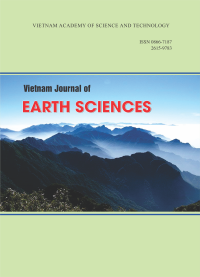Development of a Web-GIS based Decision Support System for earthquake warning service in Vietnam
Author affiliations
DOI:
https://doi.org/10.15625/0866-7187/40/3/12638Keywords:
Web-GIS, decision support system, earthquake hazard, RAREAbstract
This paper describes the development of a Decision support system (DSS) for earthquake warning service in Vietnam using Web GIS technology. The system consists of two main components: (1) an on-line database of earthquakes recorded from the national seismic network of Vietnam, and (2) a set of tools for rapid seismic hazard assessment. Using an online earthquake database, the system allows creating a shake map caused by a newly recorded earthquake. In addition, the Web GIS environment allows any user, including non-professional to get useful information about a just-occurred event and the possible impact caused by the earthquake shortly after its occurrence. A fault-source model developed for Vietnam was used as a part of the hazard calculation and mapping procedure. All information and results obtained from the system are automatically included in the earthquake bulletins, which will be disseminated national wide afterward by the Vietnam earthquake information and tsunami warning Center.
The shake maps produced by the DSS in terms of both Peak Ground Acceleration and intensity values are rapidly available via the Web and can be used for emergency response, public information, loss estimation, earthquake planning, and post-earthquake engineering and scientific analyses. Application of the online decision support system in earthquake warning service can mitigate the earthquake risk and reduce the losses and damages due to earthquakes in Vietnam in future.
References
Boore D.M., Joyner W.B. and Fumal T.E., 1994. Estimation of Response Spectra and Peak Acceleration from Wester North American earthquakes: an interim report, USGS open file report, 94-127, Menlo Park, California, United States Geological Survey.
Boore D.M. and Atkinson G.M., 2008. Ground-Motion Prediction Equations for the Average Horizontal Component of PGA, PGV, and 5%-Damped PSA at Spectral Periods between 0.01 s and 10.0 s. Earthquake Spectra, 24(1), 1-341.
Bui Van Duan, Nguyen Anh Duong, 2017. The relation between fault movement potential and seismic activity of major faults in Northwestern Vietnam. Vietnam J. Earth Sci., 39, 240-255.
Campbell K.W. and Bozorgnia Y., 1994. Near-Source Attenuation of Peak Horizontal Acceleration from Worldwide Accelerograms Recorded from 1957 to 1993, Proceedings, Fifth U.S. National Conference on Earthquake Engineering, Chicago, Illinois, July 10-14: V(III), 283-292.
Campbell K.W. and Bozorgnia Y., 2008. NGA Ground Motion Model for the Geometric Mean Horizontal Component of PGA, PGV, PGD and 5% Damped Linear Elastic Response Spectra for Periods Ranging from 0.01 to 10s. Earthquake Spectra, 24(1), 1-341.
Cauzzi C., Edwards B., Fäh D., Clinton J., Wiemer S., Kastli F., Cua G. and Giardini D., 2014. On the customisation of shakemap for optimised use in Switzerland, 2014. Proceedings of the 2nd European Conference on Earthquake Engineering and Seismology, Istanbul, August 25-29, 1-10.
Center for International Earth Science Information Network - CIESIN - Columbia University, 2016. Documentation for the Gridded Population of the World, Version 4 (GPWv4). Palisades NY: NASA Socioeconomic Data and Applications Center (SEDAC). http://dx.doi.org/10.7927/H4D50JX4 Accessed April 2018.
Chiou B.S.-J. and Youngs R.R., 2008. An NGA Model for the Average Horizontal Component of Peak Ground Motion and Response Spectra. Earthquake Spectra, 24(1), 1-341.
Cornell, C.A., 1968. Engineering seismic risk analysis. Bull. Seis. Soc. Amer., 58(5), 1583-1606.
Der Kiureghian and A. S-H. Ang, 1977. A fault rupture model for seismic risk analysis, Bull. Seim. Soc. Am., 67(4), 233-241.
Douglas B.M. and Ryall A., 1977. Seismic risk in linear source regions, with application to the San Adreas fault, Bull. Seis. Soc. Amer., 67, 729-754.
Marreiros, C. and Carrilho, F., 2012. The ShakeMap at the Instituto de Meteorologia. The proceedings of the 15th World Conference on Earthquake Engineering, Lisbon, Portugal September 24-28.
Nguyen Le Minh, et al., 2012. The first peak ground motion attenuation relationships for North of Vietnam. Journal of Asian Earth Sciences. Doi: 10.1016/j.jseaes.2011.09.012.
Nguyen Dinh Xuyen and Tran Thi My Thanh, 1999. To find a formula for computing ground acceleration in strong earthquake in Vietnam, J. Sci. of the Earth, 21, 207-213 (in Vietnamese).
Pacific Earthquake Engineering Research Center, 2008. NGA model for average horizontal component of peak ground motion and response spectra. Earthquake Spectra, 24(1), 1-341.
Tran V.H. and Kiyomiya O., 2012. Ground motion attenuation relationship for shallow strike-slip earthquakes in northern Vietnam based on strong motion records from Japan, Vietnam and adjacent regions, Structural Eng./Earthquake Eng., JSCE, 29, 23-39.
Toro G.R., Abrahamson N.A. and Schneider J.F., 1997. Engineering Model of Strong Ground Motions from Earthquakes in the Central and Eastern United States, Seismological Research Letters, January/February.
Wald D.J., Worden B.C., Quitoriano V. and Pankow K.L., 2006. ShakeMap Manual. Technical manual, users guide, and software guide.
Wald D.L., Wald B. Worden and Goltz J., 2003. ShakeMap - a tool for earthquake response. U.S. Geological Survey Fact Sheet 087-03.
Wells D.L. and Coppersmith K.J., 1994. New Empirical Relationships Among Magnitude, Rupture Length, Rupture Width, and Surface Displacement, Bulletin of the Seismological Society of America, 84,
974-1002.






